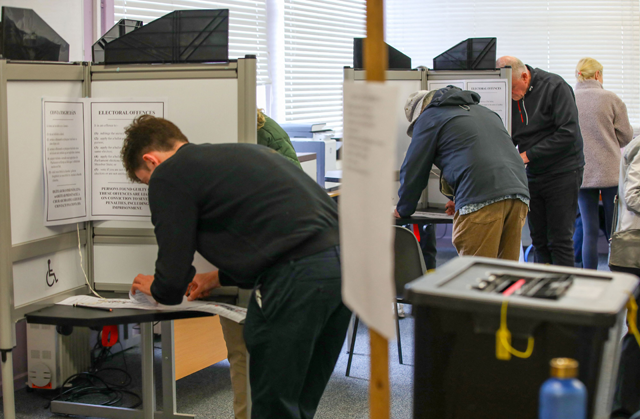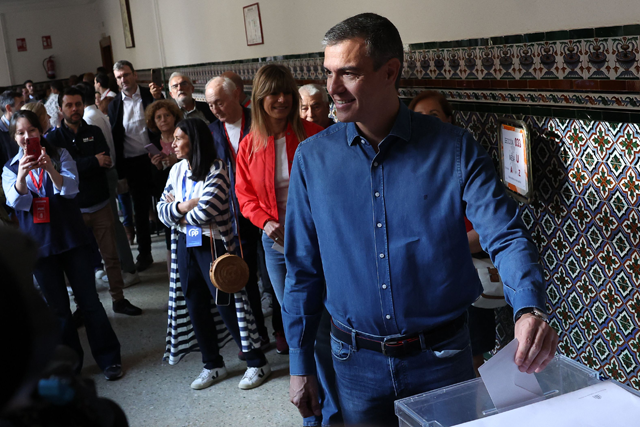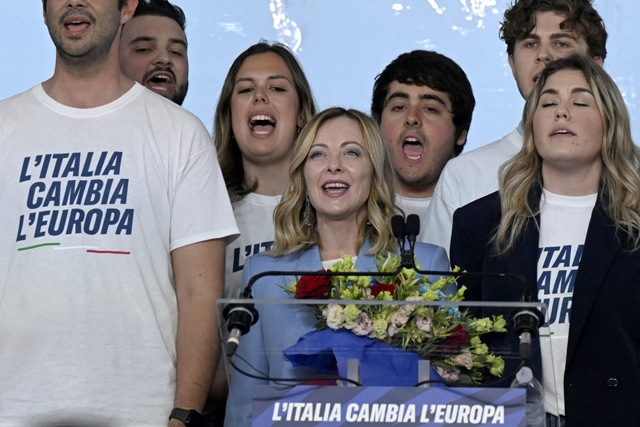You are here
EU election passes halfway mark as Slovakia, Italy join in
By AFP - Jun 08,2024 - Last updated at Jun 08,2024

Voters mark their ballot papers as they vote at a polling station at Plunket College in Dublin on Saturday, to vote in the European Union and local elections (AFP photo)
BRUSSELS, Belgium — Four days of voting to choose a new European Parliament passed the halfway mark Saturday with Slovakia — shaken by an assassination attempt last month on its premier — and influential Italy joining in.
Most of the European Union’s 27 member countries, including powerhouses France and Germany, go to the polls on Sunday, the final day, with projected overall results due late that evening.
Slovakia’s voters have rallied to the ruling left-wing populist Smer-SD Party in the wake of the May 15 shooting of Prime Minister Robert Fico, who blamed the attack on the main liberal opposition and its “aggressive and hateful politics”.
Authorities said the assassination attempt, by a 71-year-old poet, was politically motivated.
One voter, Jozef Zahorsky, a 44-year-old teacher, said “it was not easy” but he cast his ballot for Smer because it stood for “the interests of Slovakia, not Brussels”.
Fico’s party opposes EU arms deliveries to Ukraine and rails against alleged “warmongers” in Brussels.
Slovakia’s president-elect, Peter Pellegrini, victor in April national polls, is also Ukraine-sceptic. On Saturday he said the European Union was at a “crossroads”, needing a “new defence policy” and an alternative to a “restrictive” Green transition harming industry and competition.
Those are positions shared with many far-right parties in Europe, which are predicted to make gains in the European Parliament.
Surveys suggest they could grab as much as a quarter of the 720 seats, weakening the centrist mainstream groupings which are expected to still come out on top.
Meloni courted
A key indicator as to the make-up of the new parliament will come from Italy, the EU’s third-biggest economy governed by a coalition led by Prime Minister Giorgia Meloni’s post-fascist Brothers of Italy.
If, as expected, her party wins, Italy could end up with significant influence over the five-year terms of both the incoming parliament and the next European Commission which will subsequently be put together.
Current commission chief Ursula von der Leyen has been courting Meloni, who along with other EU leaders will decide whether to give her a second mandate or replace her.
Von der Leyen has indicated willingness to have her European People’s Party work with far-right lawmakers in the parliament, as long as they are pro-EU and not what she calls “puppets” of Russian President Vladimir Putin.
She explicitly ruled out allying with Marine Le Pen’s National Rally in France and Germany’s AfD on those grounds.
Both of those parties — unlike Meloni’s — are leery of EU military and financial support to Ukraine against Russia’s invading forces, with the AfD outright hostile to weapons deliveries.
Hungary’s ruling populist Fidesz Party is likewise opposed to further helping Kyiv.
The lead-up to the European Union elections in various countries has been marred by incidents of violence, though not all linked to political motives.
Late Friday in Denmark, which votes on Sunday, a man hit the prime minister, Mette Frederiksen, in a Copenhagen square. She was not seriously hurt, according to witnesses. Police arrested the assailant but gave few details.
‘Scary’ far-right
In Italy, Meloni has put her name on the EU ballot papers as the lead candidate for the Brothers of Italy, though she does not intend to take up a seat in the European Parliament if chosen.
Instead she aims to bolster her Party’s grip on Italy’s fractious political scene, possibly at the expense of her junior coalition partner, the far-right League party.
In a video message posted on social media Saturday, Meloni said her priorities were to “defend Europe’s borders against illegal immigration [and] protect the real economy and jobs”.
Immigration is the hot-button issue driving much European support to the far-right.
In The Netherlands, which voted Thursday, the anti-immigration party of extreme-right leader Geert Wilders — also in the governing coalition — won second place, according to exit polls.
Voters in Ireland and the Czech Republic cast their ballots on Friday, with rhetoric around immigration — and the far-right’s focus on that — foremost in many minds.
“The rise of the far-right jumping on immigration is really, really scary for us,” said one Irish voter, 42-year-old finance worker Trevor Gardiner.
Related Articles
BRATISLAVA — Slovakia’s Prime Minister Robert Fico suffered a surprise defeat in EU elections to the opposition liberals on Sunday, weeks af
BRUSSELS, Belgium — Voting for the EU's next parliament entered its final stretch Sunday for millions of people, from Vilnius to Madrid, wit
ROME — Italian Prime Minister Giorgia Meloni said on Sunday she would stand in upcoming European Parliament elections, a move apparently cal













